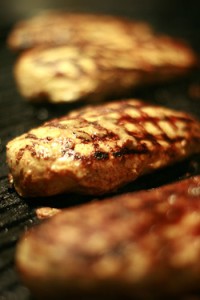 Protein is one of the most fundamental building blocks of the human body. Almost everything needs protein, from cell structures and membranes to blood and bones, from muscles, skin and hair to other organs like the liver. Enzymes, which drive and control metabolism, are also proteins.
Protein is one of the most fundamental building blocks of the human body. Almost everything needs protein, from cell structures and membranes to blood and bones, from muscles, skin and hair to other organs like the liver. Enzymes, which drive and control metabolism, are also proteins.
We don’t use the actual proteins from our food in our bodies. The protein we eat must first be broken down into individual building blocks, called amino acids, during digestion. There are 20 different amino acids. Several of them are considered essential, meaning humans cannot synthesize them. The others can be synthesized by metabolizing one amino acid into another.
Once the amino acids from food are absorbed, they’re linked back together to synthesize the many proteins that are specific to our needs. The human body has over 10,000 different proteins, and they are constantly turned over, broken down and re-synthesized as cells metabolize and grow, enzyme needs change and tissues require repair. Eating protein replenishes the supply of amino acids for all these needs.
Daily protein intake from a mixed and balanced diet should meet a minimum amount on average. While the RDA chart below provides average recommendations, individual requirements can be calculated using the following recommended formulas:

- As you can see, growth states, such as infancy, childhood and pregnancy, require a higher protein intake.
- *Note that for overweight individuals, ideal body weight should be used to calculate protein requirement, not actual weight.
Recommended Dietary Allowances for Protein
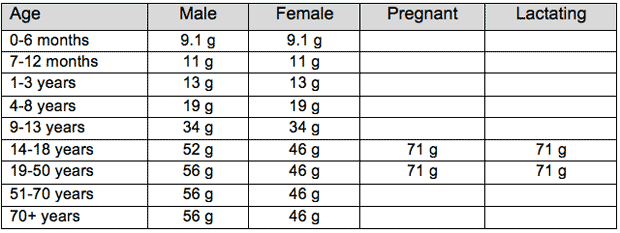 Source: Food and Nutrition Board, Institute of Medicine, National Academies
Source: Food and Nutrition Board, Institute of Medicine, National Academies
In developed countries such as the U.S., intake typically exceeds these modest levels, due to high intake of animal source foods, which are high in protein. Diets that include few animal-derived foods are typically lower in total protein, and can be lower in protein quality.
Protein quality depends on the amounts and ratios of the essential amino acids in the food. In general, animal foods, like meat and dairy, are considered high quality protein, because the amount of protein is high, and the ratios of the essential amino acids are close to the ratios required by humans. Egg is one of the highest quality proteins of any food. Gelatin is one of the lowest quality proteins; even though it’s from an animal source, it lacks several key amino acids.
While many plant foods, such as whole grains and legumes, contain significant protein, the quality is limited because those foods typically lack one or more of the essential amino acids. If you have a very limited diet, and rely only on one plant food for most of your protein, you could end up deficient in certain amino acids. That’s why it’s essential for vegans and vegetarians to eat a variety of plant-based foods, to get a healthy variety of amino acids.
Which Foods Have Protein?
Cheese
Yogurt
Cottage cheese
Eggs
Soy milk
Beef
Chicken
Turkey
Lamb
Buffalo
Fish
Soy beans
Tofu
Nuts
Nut butters
Legumes (kidney beans, black beans, garbanzo beans, etc)
What Happens If You Don’t Get Enough?
Outright protein deficiency is not common in developed countries. It is seen most often in impoverished regions, where there is famine or people have limited food resources. Protein deficiency disease in Infants and children is called kwashiorkor.
Symptoms include growth failure, immune dysfunction and loss of muscle, including heart muscle, which leads to a weakened heart. One of the classic signs is a thin child with a large bloated belly. Edema, fatigue, lethargy and dry brittle hair are other outward signs.
While severe protein deficiency is rarely seen in developed countries, inadequate protein intake can lead to health problems. Elderly people may end up eating protein deficient diets for many reasons, such as loss of appetite or taste sensation, disinterest in cooking or problems chewing.
Adequate protein is important to maintain muscle mass, as well as bone strength, so it’s important for elderly people to consume enough quality protein.
High protein foods are frequently recommended to dieters, to help with satiety and appetite control. Protein foods are digested more slowly than carbohydrates, and can help control appetite, so it makes sense for dieters to include foods with protein at all meals and snacks.
But over-eating protein isn’t likely to be helpful. There’s a limit to how much protein can be synthesized into muscle every day. Excess protein can’t be stored. Excess amino acids are broken down and converted to glucose, which is either burned as energy or transformed to fat and stored. Glucose and fat cannot be converted back to amino acids. When it comes to protein, getting enough good quality protein throughout the day is the best plan.
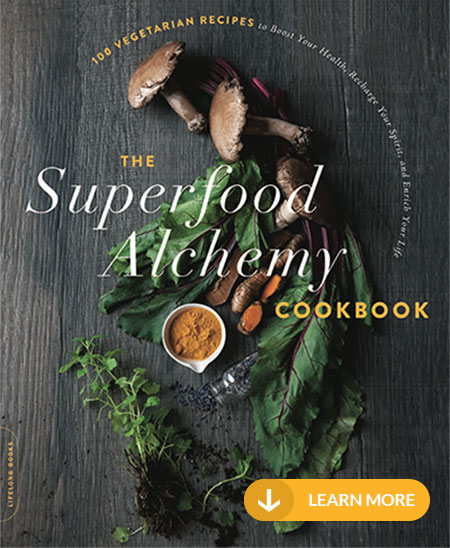

 Are you ready to look better, feel more energized, and get back that youthful feeling you remember having as a kid? I can help you on a journey that will change the way you eat — for good. My
Are you ready to look better, feel more energized, and get back that youthful feeling you remember having as a kid? I can help you on a journey that will change the way you eat — for good. My 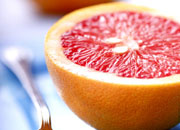











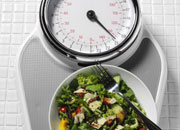


 As a healthy cooking expert, health coach and TV host,
As a healthy cooking expert, health coach and TV host, 

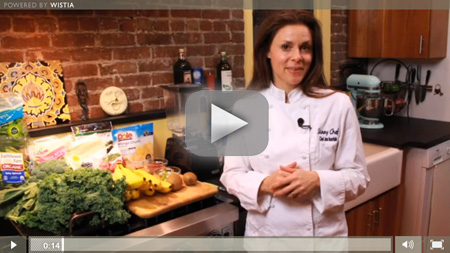
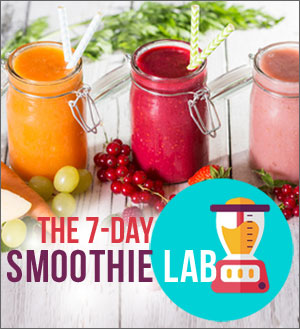
Speak Your Mind